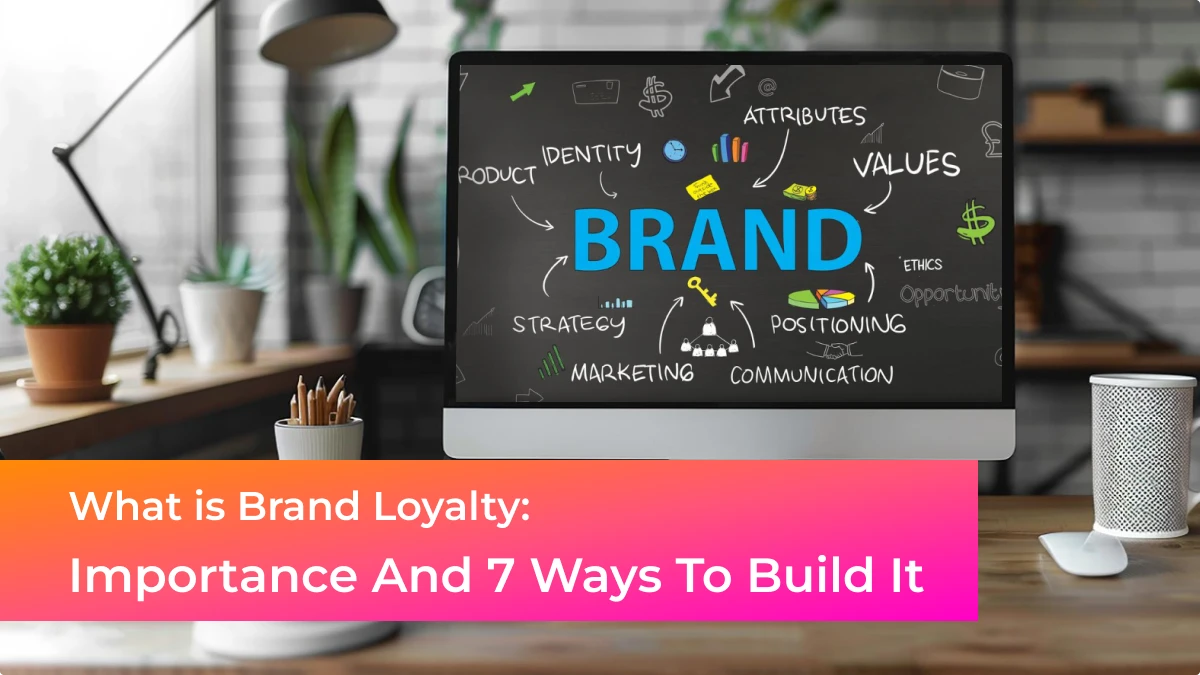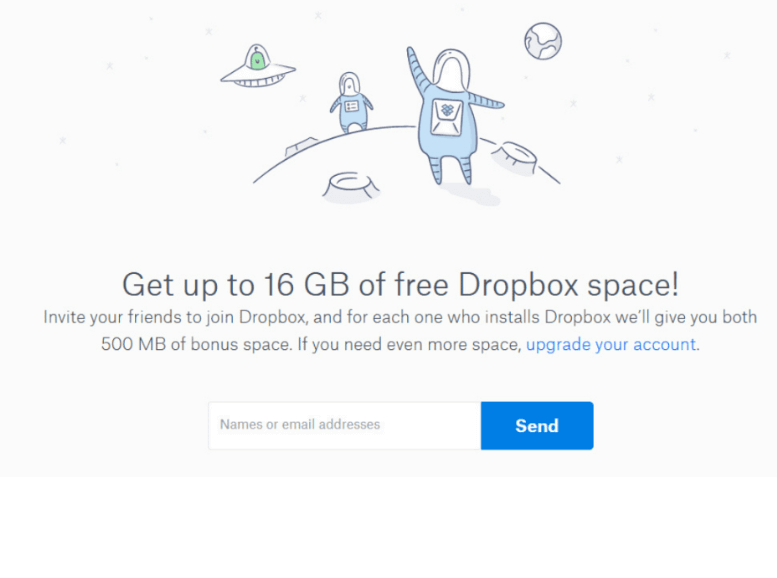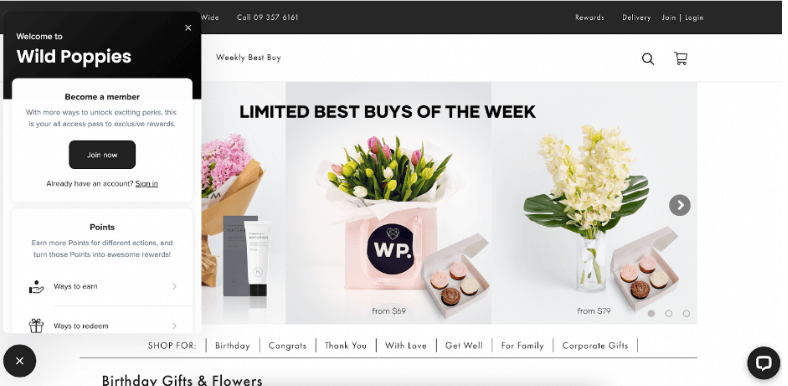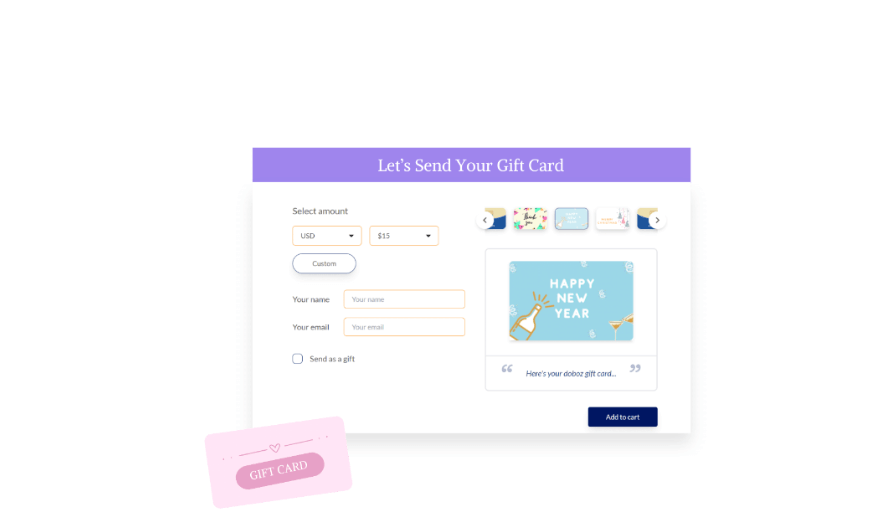
Mrudul

When you think about your preferred grocery store, phone service provider, or airline, it’s likely you have a clear favorite. This preference isn’t just about convenience; it’s about a deeper connection. Customers often form a strong loyalty to brands that consistently deliver exceptional service, innovative designs, or outstanding products.
According to the 2019 Edelmen Report: 67% of consumers say they need to trust the brand behind a product or service. In today’s competitive market, where consumers are bombarded with endless options, fostering brand loyalty can seem like a daunting task for companies. Having a good reputation isn’t enough. However, many brands have mastered the art of captivating their clientele through continuous innovation and superior customer engagement.
Table of Contents:
Brand loyalty is when customers repeatedly choose to purchase from the same brand, favoring it over competitors even when similar options are available. It’s not merely a habit; it’s a preference that involves strong positive associations and feelings towards the brand. This enduring loyalty stems largely from how customers perceive the brand’s actions, values, and overall presence in the market.
Many of us have brands that we’re deeply loyal to—it could be the local coffee shop that knows your order by heart, your reliable internet provider, or even a brand whose products you’ve never purchased but still feel a connection with. This bond largely stems from trust, which is the cornerstone of brand loyalty.
Brand loyalty plays a pivotal role in maintaining customer retention and boosting repurchase rates. When a brand successfully aligns its values with those of its customers, it doesn’t just sell products—it builds lasting relationships. These relationships are critical in a marketplace where choices are abundant and customer preferences can shift rapidly.
In essence, brand loyalty isn’t just about the transactions that occur. It’s about the emotional connection and trust that a brand builds and maintains with its customers, which in turn drives long-term business success. That’s why it’s crucial for brands to build brand loyalty.
To better understand this concept, it’s crucial to distinguish between customer loyalty and brand loyalty.
While often used interchangeably, brand loyalty and customer loyalty are distinct concepts in the marketing world. Customer loyalty primarily focuses on the financial aspects of consumer behavior—how often customers spend and what they buy from a brand.
Known as transactional loyalty, this form of loyalty is influenced by practical factors such as pricing, discounts, and rewards programs. A 2020 global survey by Statista revealed that 62% of consumers remain loyal to brands due to competitive pricing.
On the other hand, brand loyalty is more about how customers perceive and feel about a brand, making it akin to emotional loyalty. It transcends mere transactions to encompass the emotional connections customers develop with a brand. It takes time and real effort to build brand loyalty
These connections can be influenced by how customers view and value a brand’s ethos, customer service, and the overall quality of its products or services. In the same Statista survey, it was found that 57% of consumers were loyal to brands that offered exceptional customer service, while 54% cited the quality of products or services as a reason for their loyalty.
This distinction highlights that while customer loyalty can be encouraged through monetary incentives, brand loyalty requires a deeper engagement with customers, fostering trust and emotional investment in the brand’s identity and values.

Brand loyalty is not just beneficial; it’s essential for sustainable growth. It transforms a regular customer base into a devoted audience that actively contributes to your brand’s success through consistent purchases. This support is crucial as your brand evolves and expands, providing a stable revenue stream that isn’t purely transaction-based.
Unlike ordinary customers who may switch brands based on pricing changes, brand loyalists are driven by their emotional connection to your brand. This dedication means they are likely to remain with you, even when market conditions fluctuate. Their loyalty is not swayed by price but by their alignment with your brand’s values and identity.
Moreover, brand loyalty turns your customers into advocates. A brand-loyal customer doesn’t just buy; they become a channel of free promotion, spreading the word about your brand through personal recommendations. Word-of-mouth marketing remains one of the most effective forms of promotion, as it brings credibility and genuine testimonials to those who might be undecided about your brand.
Every endorsement from a loyal customer not only reinforces their commitment but also brings your brand closer to gaining new patrons. Therefore, investing in nurturing these relationships can help grow your customer base organically.
Such loyalty is deeply rooted and tends to last longer, surviving market changes and competitive pressures. However, maintaining this loyalty requires your brand to stay true to its core identity—if your brand loses its way, so might your loyal customers.
Building and maintaining brand loyalty isn’t just a strategy; it’s an ongoing commitment to your audience that promises significant returns on investment, both financially and in brand value. Discovering how to build brand loyalty and ways to increase brand loyalty are crucial steps in fostering this vital connection.
Businesses often employ various marketing tactics to cultivate loyal customers by offering incentives such as gift cards or loyalty programs.
Below are the different levels of brand loyalty:
Hard-core brand loyal customers exhibit unwavering enthusiasm for a particular brand, associating with it positively due to exceptional experiences. For example, imagine a high-end coffee brand that consistently delivers unique and satisfying flavors.
Loyal customers of this coffee brand are often seen recommending their favorite brews to friends, much like Apple users do with new iPhones. If you manage to build brand loyalty like this, consider launching a rewards program to thank your brand ambassadors and encourage them to keep spreading the word.
Split customers maintain loyalty to a select few brands, usually two or three, making them harder to convert into hard-core loyalists due to their awareness of alternatives. For instance, a consumer might favor sports apparel from both Nike and Adidas.
While they appreciate the distinct styles and innovations each brand offers, they aren’t exclusively committed to one. To increase brand loyalty among such consumers, brands can emphasize unique benefits or exclusive offers that are not available from competitors.
Shifting loyal customers swing between hard-core and split loyalty, often switching allegiance after a certain period. Consider book lovers who may be devoted to one particular publisher or genre for some time, only to explore new genres or authors as their interests evolve.
Initially, these consumers might stick to mystery novels from a specific author, but over time, they start exploring historical fiction from another. Strategies on how to create brand loyalty in such cases include providing continuous innovation or refreshing product lines to re-engage these customers.
Establishing effective loyalty programs is a key strategy for maintaining customer interest and encouraging repeat business. These programs should not only reward transactions but also foster a genuine sense of belonging and appreciation among your customers. Loyalty programs, as the name suggests, is the go-to strategy to build brand loyalty over a long time. Here are some detailed strategies to consider:
The way you present your brand greatly impacts how consumers feel connected to it. To foster a deep brand loyalty, it’s essential to craft a brand story that resonates with authenticity and relatability. This narrative should be evident in all your brand materials, from your visual identity to your marketing messages. Reflect on these questions as you hone your brand strategy:
Aligning your brand with the perceptions and expectations of your target audience is critical. Consider conducting surveys or community forums to better align your brand with the needs and desires of your consumers, a crucial step to build brand loyalty.
The consistent delivery of superior quality products or services is fundamental to any successful brand strategy. Quality is not just a feature of the product or service but a core attribute that reflects the brand’s reputation and reliability. The 2021 Consumer Expectations Report by Zendesk highlights that 73% of customers will switch to a competitor after just one bad experience if it involves a product’s quality failure.
For businesses ranging from gourmet coffee shops to high-tech gadget companies, maintaining high standards is essential. This commitment to quality helps turn casual buyers into loyal customers by building trust and satisfaction and helps build brand loyalty
You can set high-quality standards by these methods
Building brand loyalty extends beyond transactions; it involves creating a sense of community among your customers. Active community engagement not only enhances the customer experience but also strengthens emotional connections to the brand, making your customers more likely to advocate on your behalf. Here’s how brands can foster this engagement effectively:
Referral programs are a powerful tool for leveraging the networks of your satisfied customers to acquire new customers, while simultaneously reinforcing the loyalty of existing ones. These programs incentivize current customers to promote your brand by offering them rewards for bringing in new clients who make purchases.
According to a study by Nielsen, referral programs are incredibly powerful, with 92% of consumers trusting referrals from people they know. This statistic highlights the effectiveness of referral marketing, as personal recommendations carry more weight than traditional advertising Here’s how to effectively implement a referral program:
Example of a successful referral program:
Dropbox’s referral program: Dropbox significantly increased its user base by offering extra storage space to both the referrer and the referee. This simple yet effective incentive encouraged existing users to invite more people to sign up, helping Dropbox grow rapidly during its early stages.
By using 99minds for your referral program software, you can ensure that your efforts are not only more efficient but also more effective in attracting new customers and retaining existing ones. This strategic approach to referral marketing is an excellent way to build and sustain brand loyalty.

Brand ambassadors play a crucial role in enhancing brand loyalty by personifying your brand’s values and connecting directly with consumers. These individuals, either influencers in relevant communities or satisfied customers, can wield significant influence over their followers’ purchasing decisions by authentically promoting your products or services. Here’s how brand ambassadors can help you build brand loyalty:
Example of successful brand ambassador use:
Lululemon’s ambassador program: Lululemon, the athletic apparel company, utilizes local athletes and fitness professionals as brand ambassadors. These ambassadors hold classes and events that not only promote Lululemon products but also embody the company’s lifestyle and values. This strategy has helped Lululemon maintain a strong community connection, enhancing brand loyalty among its customer base.

Exceptional customer service is critical in building and sustaining brand loyalty. When businesses prioritize high-quality service, they not only meet customer expectations but often exceed them, creating a memorable experience that encourages repeat business and fosters a loyal customer base. Here’s how exceptional customer service can enhance brand loyalty:
In today’s competitive market, establishing strong brand loyalty is essential for business growth and customer retention. 99minds offers an omnichannel solution that helps businesses seamlessly integrate gift cards, loyalty programs, referral programs, and store credit systems to enhance their customer engagement strategies. Here’s how 99minds can help you build brand loyalty effectively:
99minds enables businesses to design and implement custom loyalty programs that reward customers for their continued patronage. Businesses have seen an increase in repeat purchases and loyal customers by using 99minds’ loyalty program.These programs are tailored to fit the specific needs of your business and your customers, ensuring that every interaction enhances their loyalty to your brand. Whether it’s through earning points for purchases, achieving different loyalty tiers, or redeeming rewards, 99minds makes it easy to keep your customers engaged and committed.

Utilize 99minds to create referral programs that motivate your current customers to bring in new customers. By providing attractive incentives for both referrers and referees, you can rapidly expand your customer base while reinforcing the loyalty of existing customers. 99minds helps streamline this process, making it easy for customers to share referral links and for you to track and manage referrals effectively.
Offering gift cards and store credit can significantly enhance customer satisfaction and retention. 99minds provides businesses with the tools to issue, manage, and track gift cards and store credits that customers can seamlessly use across various purchasing channels. This flexibility not only improves the shopping experience but also strengthens brand loyalty by providing convenient and flexible buying options.

99minds support omnichannel capabilities, ensuring that your loyalty programs, referral programs, and gift card systems work seamlessly across all sales channels, whether online, in-app, or in-store. This integration ensures a consistent and unified customer experience, which is crucial for building trust and brand loyalty.
With 99minds, you gain access to valuable analytics and insights about your loyalty programs and customer behaviors. These insights allow you to optimize your strategies and ensure that your efforts to build brand loyalty are as effective as possible.
Understanding how to measure and track brand loyalty is crucial for any business aiming to assess the impact of their customer engagement and retention strategies. Measuring brand loyalty not only provides insights into customer preferences and behaviors but also helps refine strategies to enhance customer loyalty further. Here are key metrics and methods to effectively track brand loyalty:
This metric indicates the percentage of customers who return to make additional purchases. A high RPR is a strong indicator of brand loyalty, as it reflects a continuing customer preference for your brand over competitors. Tracking changes in this rate can help you gauge the effectiveness of your efforts to build brand loyalty.
NPS assesses customer satisfaction and loyalty by asking customers how likely they are to recommend your brand to others. This score helps you understand the degree of customer advocacy for your brand, a crucial aspect of brand loyalty. Higher scores are often correlated with greater brand loyalty.
Analyze engagement across various channels, including social media interactions, email open rates, and participation in loyalty programs. Tools like 99minds provide analytics that can help track these interactions, offering insights into how engaged and loyal your customers truly are.
Regularly collecting and analyzing customer feedback can provide direct insights into how customers perceive your brand and whether they feel loyal. Implement feedback loops that encourage customers to share their experiences and opinions, helping you identify strengths to build upon and areas for improvement.
The churn rate, or the rate at which customers stop doing business with a brand, is a critical metric for measuring brand loyalty. A low churn rate indicates high customer retention, a direct result of successful brand loyalty-building efforts. Monitoring this rate can help you identify and address issues before they lead to increased customer turnover.
In summary, fostering brand loyalty is essential for any business aiming for longevity and success. Tools like 99minds can greatly enhance these efforts by streamlining the creation and management of loyalty and referral programs. We hope this guide inspires you to strengthen your strategies for brand loyalty, ensuring your brand remains a top choice for consumers.